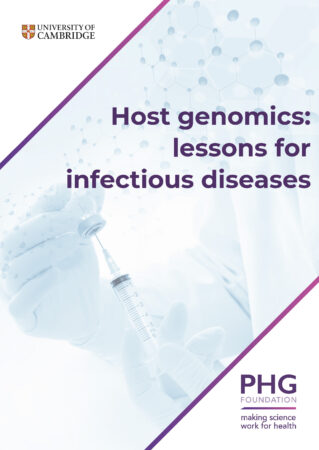Home Publications Reports Host genomics: lessons for infectious disease
Host genomics: lessons for infectious disease
In Host genomics: lessons for infectious disease, we explore the potential of this complex field in tackling infectious disease. Based on our investigation of four major pathogens, we make recommendations to policy influencers and research funders on the opportunities and challenges faced by researchers working to deliver better precision-based approaches for infectious disease management.
These four pathogens, Hepatitis C Virus (HCV), Human Immunodeficiency Virus (HIV), Mycobacterial tuberculosis and SARS-CoV-2, continue to have a major impact on global populations.
What is host genomics research?
Infectious diseases elicit different responses among individuals exposed to the same pathogen – some people are more susceptible, and the severity of symptoms varies from person to person. Host genomics research aims to identify genetic variants that explain these differences in response, helping to improve infectious disease prevention and treatment. But, given the limited resources, host genomics research needs to be undertaken in the context of the public health and clinical priorities for each infectious disease.
Key findings in Host genomics: lessons for infectious disease
- The clues provided by host genomics research identify critical elements of the immune system that underpin an individual’s ability to resist or overcome infection.
- And yet, the field of host genomics research is fragmented, lacks coordination, and can feel unconnected to the broader context of essential infectious disease research.
- Despite pockets of success, only a small proportion of host genomics research has led to new or improved treatments or diagnostics.
- Efforts to combat infectious disease are already frequently under-resourced, disproportionately affecting low- and middle-income countries, where infectious diseases are a leading cause of morbidity and mortality.
We advocate a more integrated and holistic approach to infectious disease research.
Policy and research recommendations
To achieve this, we make three high-level recommendations:
- Develop a host genomics research strategy that supports greater coordination and strategic decisions on funding, through engaged consultation of active infectious disease researchers.
- Support host genomics research through collaboration, standardisation of research methods, development of robust infrastructure in affected countries, and ensure adequate funding for functional studies and translational research.
- Embed translation from the start by supporting a longer and more strategic model of research delivery; one that recognises infectious diseases as an ongoing and global health priority.
Reflecting on where the science falls short, the report highlights for researchers where they might refine their efforts and realise the benefits host genomics research can bring to population health. With its honest appraisal of where this science adds value, Host genomics: lessons for infectious disease can also support funders and policy influencers with decision-making to address the challenges and opportunities identified.

